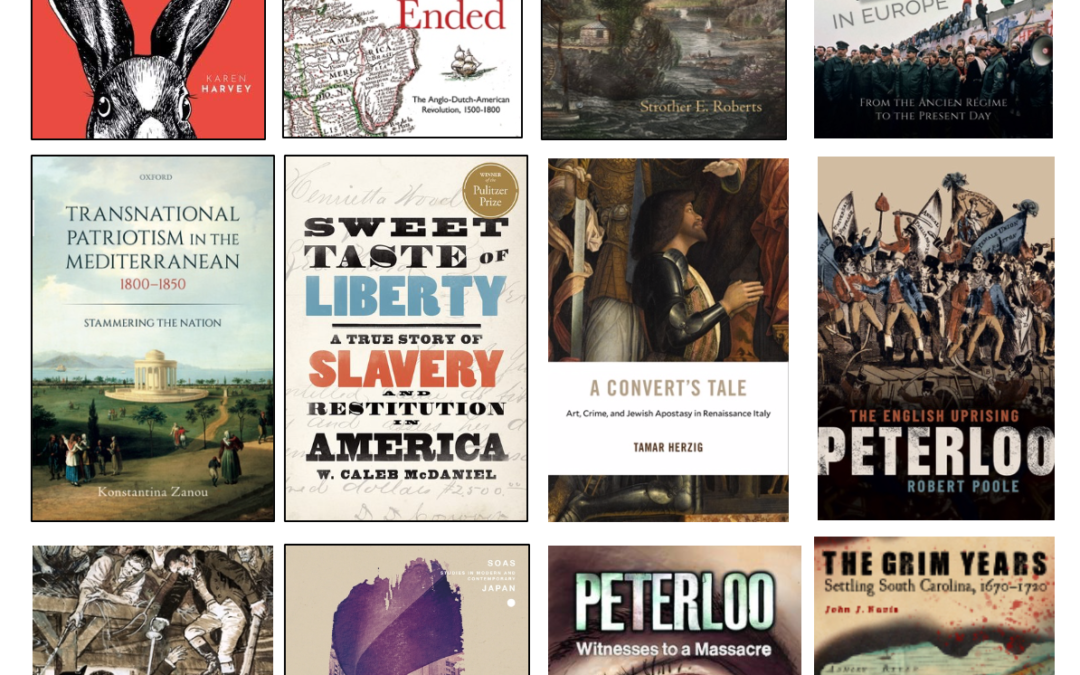By Vanessa Rockel and Philip Carter
Would you like to help shape the future of the IHR’s Reviews in History?
We’re currently inviting applications to join our editorial advisory board. ‘Reviews in History’ is an online service run by the historical community for the community and we’re keen to ensure our regular updates best reflect the diversity of research and publishing in the 2020s.
We also know you are extremely busy, now more than ever.
Editorial board members offer us advice on the most important books to review in their field. From new board members we seek specialist knowledge and ideas, rather than time. We work informally and by email, with editors sending in their top recommendations for reviews and reviewers every couple of months.
If you’re interested, there are details below on how to get in touch. But, first, a brief word on Reviews in History and what we’re seeking from our editorial advisors.

What is Reviews in History?
Reviews is a site where people interested in History talk about History—principally in the form of new books but also digital resources, exhibitions, TV and films. Created in the mid-1990s, Reviews in History now has nearly 2500 reviews, all of which are freely available.
Book reviews are available in many places, not least academic journals. The IHR platform is a bit different in several ways: its reviews are typically longer than those in journals (usually 2000-3000 words); we also invite a book’s author to respond to the review, and publish both commentaries together; and we focus on new books published in the last year. Our aim is content that evaluates a work and sets it in wider historiographical and methodological contexts, often in dialogue with its author.
Reviews in History is run from within the IHR’s small publishing team. We publish two reviews weekly, typically on a Friday.
Scale means we have to choose carefully when it comes to spotting notable new works, and here we draw on the insight and expertise of our existing editorial advisory board who you’d be joining. In recommending what to review, we’re not limited to a particular kind of History and we review works from university presses and trade publishers (e.g. Penguin and Bloomsbury) worldwide.
Over the coming months, we’re are also looking to develop Reviews in History: rethinking the website and interface; harnessing the different ways people write and talk about new books; considering the outputs of new publishers and alternative forms of academic History publishing; and (especially) extending the range of our coverage—to reflect new research trends and methodologies, and ensure our contribution to the reviews world is as useful and interesting as possible.
New editorial advisors: what we’re looking for
Our editorial advisory board is made up of specialist researchers and lecturers who play a key role in Reviews in History. Their expertise and networks help us identify important new books (and other content) in a range of subject areas, chronologies and geographies. They also know who’s a good person to invite to review for us.
We’re now looking to supplement our current advice network by appointing new people to our editorial advisory group. Our current advisers are experienced researchers in their field and we seek specialists of a similar status with an interest in History publishing, i.e. a minimum of advanced PhD, post-doctoral researchers, faculty or those with research experience working in related fields.
We hope you might consider joining them. If so, in this capacity we’d ask you to:
- send us occasional updates on important new (and forthcoming) books in your field: most board members email us every 1-2 months with a handful of suggestions. This can include content other than new books
- email us recommendations for who might review the work
- very occasionally, advise on a review once it’s been submitted
- offer ideas for developing Reviews in History in new directions
- promote Reviews to colleagues, and encourage them to sign up for our weekly mailing
At the same time, we won’t ask you to:
- fill a set allocation of slots – this is you passing on your knowledge about notable publishing as it becomes available
- read the reviews when submitted, though we may occasionally ask your advice on particular points
- edit submitted reviews – that’s done at the IHR
- review the works you suggest, though of course you’re welcome to write for us
In terms of new editorial advisors, we’re especially keen to develop in the following areas:
- geographies: studies of (and historians working within) the global South, especially south and central America, southern, western and eastern Africa; also the Caribbean, Middle East, south and south-east Asia, Russia and Canada
- subject areas and approaches: for example, Black history, Asian history, histories of ethnic minorities, of environment and climate, life-cycles, migration, technology, sexuality and gender, well-being, ‘big history’, digital history, history in interdisciplinary context, new methodological approaches to the past, and new ‘experimental’ forms of historical writing
- historians working outside of the UK and North America: we very much welcome applications from historians working in English in Europe and worldwide, as we do scholars in the UK and North America, of course
- history beyond HE: we also seek advisers active in research archives, museums, galleries and heritage organisations

How to contact us
If you’d like to be considered, please email us a short statement with the following:
- your name
- institutional affiliation (if applicable) and link to any public personal webpage
- area/s of research specialism (fields, chronologies, geographies)
- a note on what you expect to bring to Reviews now you know our aims for the future, plus anything else you’d like to communicate (no more than 300 words)
Please send this (headed ‘editorial advisory board’) to Vanessa Rockel, Managing Editor of Reviews ( vanessa.rockel@sas.ac.uk by Friday 27 November 2020. We’ll then review all submissions with the aim of making new appointments to the board from December 2020.
The editorial board is not limited in number and all members share their advice and expertise without renumeration.
We hope to hear from you. Thank you
Vanessa Rockel is Managing Editor of the IHR’s Reviews in History
Philip Carter is Head of Digital and Publishing at the IHR.

